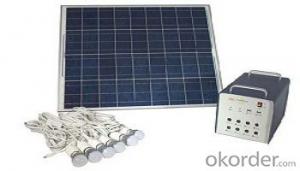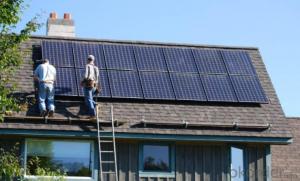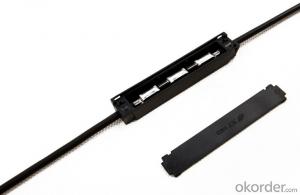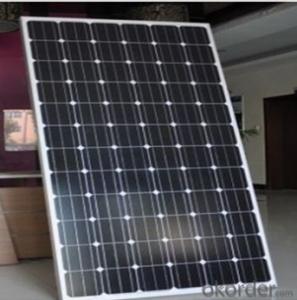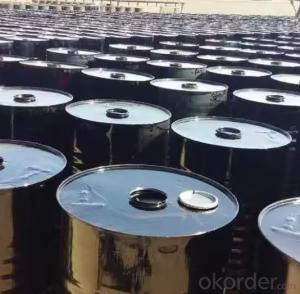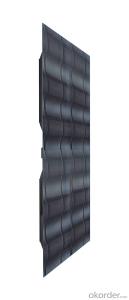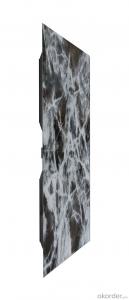Solar Home System CNBM-K4 (300W)
- Loading Port:
- China Main Port
- Payment Terms:
- TT or L/C
- Min Order Qty:
- 1 set set
- Supply Capability:
- 1000 sets per month set/month
OKorder Service Pledge
OKorder Financial Service
You Might Also Like
Brief Introduction of Solar Energy System CNBM-K4 (300W)
CNBM Home System-K4 (300W) has a wonderful capacity.It can be used in factory,home,school and other CNBM Home System-K4 (300W) consist of the solar modules,charge controller,inverter and battery banks.
CNBM International is highly recognized by its business partners and clients all over the world and has obtained rapid development under the spirit of win-win .
With CNBM Home System-K4 (300W),
We will carry on the mutual beneficial,innovative and revolutionary trading structure as we did before,create value for our employees,share holders and clients and benefit the whole society in our future development.Please contact us ,if you have interest in CNBM Home System-K4 (300W),don’t hesitate!
The Sketching of Solar Energy System CNBM-K4 (300W)
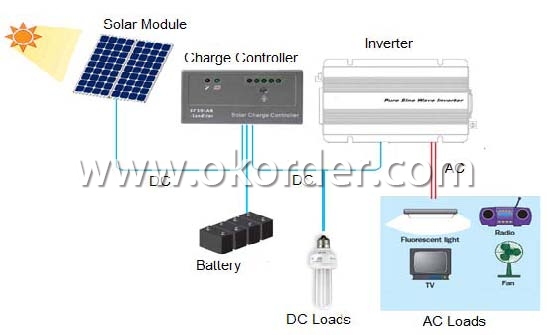
Components of Solar Energy System CNBM-K4 (300W)
PV Array:
Convert sunlight instantly into DC electric power. Formed by the solar modules (also called photovoltaic modules) in accordance with the system requirements for series and parallel.
Solar Charge Controller:
A charge controller may be used to power DC equipment with solar panels. The charge controller provides a regulated DC output and stores excess energy in a battery as well as monitoring the battery voltage to prevent over charge or over discharge. An inverter can be connected to the output of a charge controller to drive AC loads.
Inverter:
Converts DC output power of photovaltaic soalr panels into standard AC power for use in the local off-grid electrical network. It is a critical component in a photovoltaic system, allowing the use of ordinary commercial appliances.
Battery banks:
Stores energy when there is an excess coming in and distribute it back out when there is a demand. Solar PV panels continue to re-charge batteries each day to maintain battery charge.
Technical data of Solar Home System CNBM-K4 (300W) | ||
Inverter | Rated load power | 1000W |
Output wave | Pure sine wave | |
Output voltage | DC 24V | |
Output frequency | DC:12V AC:220V | |
Precision of output | 50HZ/60HZ | |
Precision of output frequency | ±6% | |
Solar panel | Pmax | 150W*2PCS |
Vmp | 18V*2 | |
Imp | 8.34A | |
Charger | Charger voltage & current | 24V 20A |
Battery | Capacity | 12V 80AH*2PCS |
Power box | Spray paint iron box,with input,output,ammeter,voltmeter,master swith and so on. | |
Package of Solar Home System CNBM-K4 (300W) | ||||
Part | Size(L*W*H mm) | Weight(kg) | 20’(pcs) | 40’(pcs) |
Power box | 580*520*540 | 60 | 84 Sets | 200 Sets |
Solar panel | 1500*700*90 | 24 | ||
Battery | 270*340*220 | 50 | ||
Factory Picture of Solar Energy System CNBM-K4 (300W)
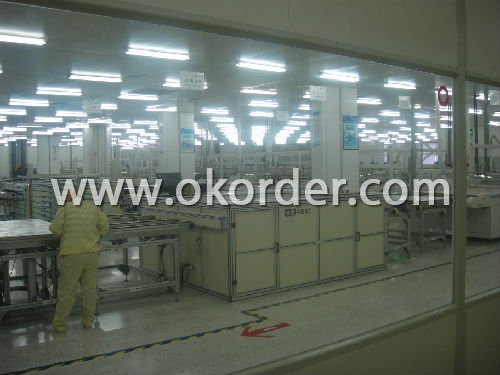
Package Picture of Solar Energy System CNBM-K4 (300W)
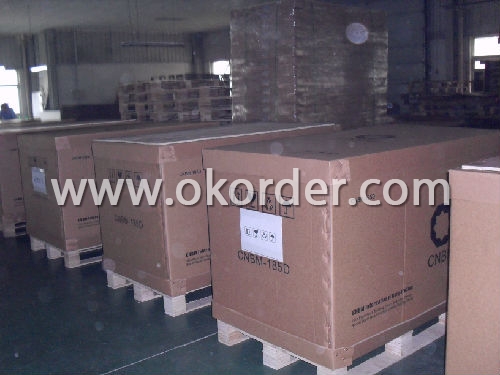
- Q:Can a solar energy system power an entire home?
- Yes, a solar energy system can power an entire home. With the right size and capacity, a solar energy system can generate enough electricity to meet the energy needs of a household, including powering appliances, heating and cooling systems, lighting, and other electrical devices. However, factors such as the home's energy consumption, the size and efficiency of the solar system, and the availability of sunlight can affect its ability to fully power the home at all times.
- Q:How do solar energy systems impact energy consumption patterns?
- Solar energy systems have a significant impact on energy consumption patterns by reducing reliance on traditional fossil fuel sources. These systems generate clean and renewable energy, thereby reducing greenhouse gas emissions and mitigating the harmful effects of climate change. Additionally, solar energy encourages a shift towards decentralized energy production and encourages individuals and businesses to become more mindful of their energy consumption, leading to greater energy efficiency and conservation.
- Q:Can solar energy systems be used for powering air conditioning systems?
- Yes, solar energy systems can be used to power air conditioning systems. Solar-powered air conditioning systems use solar panels to generate electricity, which is then used to operate the air conditioning unit. This helps reduce the reliance on traditional electricity sources and is a sustainable and cost-effective solution for cooling homes and buildings.
- Q:Can solar energy systems be used in areas with high altitude?
- Yes, solar energy systems can be used in areas with high altitude. In fact, solar panels can often be more efficient in high-altitude regions due to thinner air allowing for more direct sunlight and less atmospheric interference. However, it is important to consider factors like temperature, snowfall, and maintenance challenges that may arise in such areas.
- Q:Can solar energy systems be used in powering theme parks or water parks?
- Yes, solar energy systems can certainly be used to power theme parks or water parks. These types of parks consume a significant amount of energy due to lighting, water pumps, rides, and various other facilities. Solar panels can be installed on rooftops, parking lots, or dedicated areas to harness sunlight and convert it into electricity. This renewable energy source can help reduce operating costs, decrease carbon emissions, and promote sustainability in the entertainment industry.
- Q:Can a solar energy system be installed in areas with high humidity?
- In areas with high humidity, it is indeed possible to install a solar energy system. Although the efficiency of solar panels may be somewhat affected by the humidity, it does not entirely hinder the installation or operation of these systems. The primary factor that affects the performance of solar panels is the amount of sunlight they receive rather than the level of humidity. However, it is crucial to bear in mind that excessive humidity or moisture has the potential to cause corrosion or harm to the electrical components of the system. Consequently, it is necessary to take proper precautions and conduct regular maintenance in order to ensure the longevity and optimal functioning of the solar energy system in areas with high humidity.
- Q:Can solar energy systems be used in areas with limited access to solar inverters?
- Yes, solar energy systems can be used in areas with limited access to solar inverters. In such cases, alternative solutions like micro-inverters or power optimizers can be employed to convert the DC power generated by solar panels into usable AC power without the need for a centralized inverter. These technologies enable more flexibility in system design and can be particularly useful in remote or off-grid locations with limited access to traditional solar inverters.
- Q:Can a solar energy system be installed on a church or religious building?
- Yes, a solar energy system can be installed on a church or religious building. In fact, many religious organizations are embracing solar power as a sustainable and environmentally-friendly solution to meet their energy needs. Installing solar panels on a church or religious building not only helps reduce the carbon footprint but also serves as a visible symbol of the organization's commitment to environmental stewardship and community outreach.
- Q:Can solar energy systems be used for powering schools?
- Yes, solar energy systems can be used for powering schools. In fact, many schools around the world are now embracing solar power to meet their energy needs. Solar panels can be installed on rooftops or in open areas within school premises to generate clean and renewable electricity. This not only reduces the school's carbon footprint but also helps save on electricity costs in the long run. Additionally, solar energy systems can also be educational tools, allowing students to learn about and engage with sustainable energy practices.
- Q:Can solar energy systems be used in powering manufacturing plants?
- Yes, solar energy systems can be used to power manufacturing plants. By installing solar panels and utilizing solar energy, manufacturing plants can reduce their reliance on traditional fossil fuel-based electricity and significantly lower their carbon footprint. Solar energy systems can provide a sustainable and renewable source of power for various manufacturing processes, helping to promote cleaner and more environmentally friendly production methods.
1. Manufacturer Overview |
|
|---|---|
| Location | Ningbo,China |
| Year Established | 2004 |
| Annual Output Value | Above US$0.3 Billion |
| Main Markets | Australia;Europe. |
| Company Certifications | ISO9001:2008;VDE;CE |
2. Manufacturer Certificates |
|
|---|---|
| a) Certification Name | |
| Range | |
| Reference | |
| Validity Period | |
3. Manufacturer Capability |
|
|---|---|
| a)Trade Capacity | |
| Nearest Port | Ningbo |
| Export Percentage | 0.4 |
| No.of Employees in Trade Department | 10 People |
| Language Spoken: | English;Chinese; |
| b)Factory Information | |
| Factory Size: | Above 4,000 square meters |
| No. of Production Lines | Above 5 |
| Contract Manufacturing | OEM Service Offered;Design Service Offered |
| Product Price Range | Average |
Send your message to us
Solar Home System CNBM-K4 (300W)
- Loading Port:
- China Main Port
- Payment Terms:
- TT or L/C
- Min Order Qty:
- 1 set set
- Supply Capability:
- 1000 sets per month set/month
OKorder Service Pledge
OKorder Financial Service
Similar products
New products
Hot products
Hot Searches
Related keywords








